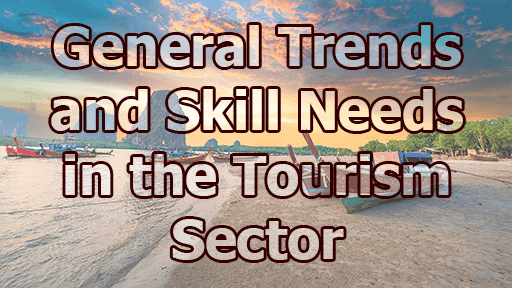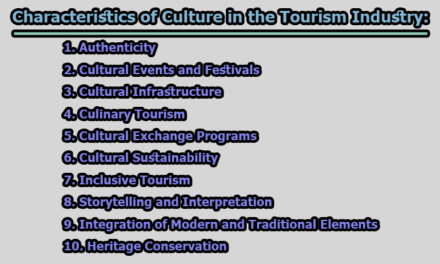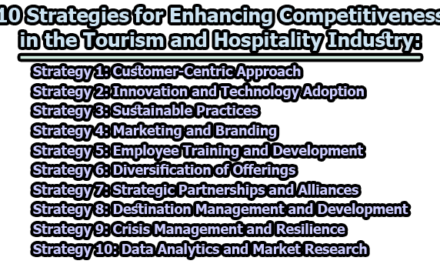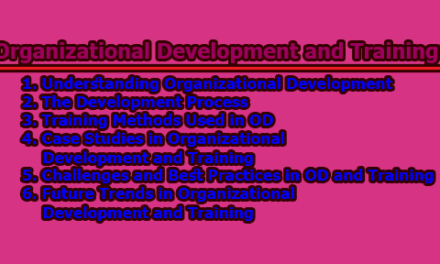General Trends and Skill Needs in the Tourism Sector:
The tourism sector is a dynamic and ever-evolving industry that is influenced by various factors, including changes in technology, shifts in consumer preferences, and global economic trends. In recent years, several general trends and skill needs have emerged in the tourism sector, which is essential for both job seekers and industry professionals to be aware of. Here, we will explore general trends and skill needs in the tourism sector.
General Trends in the Tourism Sector:
1. Sustainable Tourism: Sustainable tourism is no longer a niche but has become a fundamental aspect of the industry. Travelers and destinations alike are recognizing the need for environmentally responsible practices. This trend includes:
a) Eco-friendly Accommodations: Many hotels and accommodations are adopting eco-friendly practices such as energy-efficient lighting, water-saving systems, and waste reduction.
b) Reduced Carbon Footprint: The industry is actively seeking ways to reduce its carbon footprint. This includes encouraging travelers to use public transportation, promoting carbon offset programs, and adopting cleaner transportation options like electric buses or car-sharing services.
c) Preservation of Natural and Cultural Heritage: Sustainable tourism places a significant emphasis on preserving the natural and cultural heritage of destinations. This involves promoting responsible tourist behavior, supporting heritage conservation efforts, and engaging with local communities to ensure their participation and benefit.
2. Digital Transformation: The impact of digital technology on the tourism sector cannot be overstated. It has revolutionized the way the industry operates and how travelers plan and experience their trips. Key components of this trend include:
a) Online Booking Platforms: The majority of travelers now book their flights, accommodations, and activities online through various platforms and websites. This shift has enabled greater flexibility and convenience for travelers.
b) Travel Apps: Mobile applications provide real-time information and services to travelers. These apps often include features such as flight tracking, navigation, translation, and reviews, enhancing the travel experience.
c) Virtual Tours: Virtual reality (VR) and augmented reality (AR) technologies have made it possible for travelers to experience destinations and attractions virtually before visiting, thus influencing their decisions and expectations.
d) Social Media Marketing: Tourism businesses leverage social media platforms to engage with travelers, showcase destinations, and encourage user-generated content. Social media has a significant influence on travel decisions and has reshaped marketing strategies.
3. Personalization: Travelers increasingly seek personalized experiences that cater to their unique interests and preferences. This trend involves:
a) Tailored Itineraries: Tour operators and travel agencies are customizing itineraries based on traveler preferences, ensuring that each trip is unique and caters to individual interests.
b) Recommendation Engines: Advanced recommendation systems use data analytics to suggest activities, restaurants, and accommodations based on a traveler’s past choices and preferences.
c) Customer Relationship Management (CRM): Tourism businesses use CRM systems to collect and manage customer data effectively, allowing them to provide personalized services and offers.
4. Crisis Management and Resilience: The COVID-19 pandemic underscored the importance of crisis management in the tourism sector. This trend involves:
a) Adaptability: The ability to quickly adapt to changing circumstances, such as travel restrictions and health and safety protocols, is essential for the industry’s survival.
b) Safety Protocols: Tourism businesses are implementing rigorous safety and hygiene protocols to protect travelers and staff during crises.
c) Diversification: Businesses are diversifying their offerings to be more resilient to sudden disruptions, such as offering virtual experiences or switching to different types of tourism.
5. Cultural Exchange: The desire for cultural immersion has grown, and tourists seek authentic and meaningful experiences. Key points include:
a) Local Engagement: Travelers are encouraged to engage with local cultures, participate in traditions, and dine at local establishments, rather than sticking to touristy areas.
b) Community-Based Tourism: Many destinations are fostering community-based tourism initiatives, which involve local communities in tourism activities, thus ensuring they benefit economically and culturally.
6. Health and Wellness Tourism: This trend focuses on the increasing demand for health and wellness-related travel experiences:
a) Spa Retreats: Travelers seek relaxation and rejuvenation at spa retreats, often set in picturesque and serene locations.
b) Fitness Vacations: Fitness and adventure-focused vacations, such as yoga retreats, hiking trips, and wellness-focused resorts, have seen a surge in popularity.
c) Medical Tourism: This involves traveling to receive medical treatments or procedures, often at a lower cost compared to one’s home country. Common medical tourism destinations include Thailand, India, and Mexico.
Skill Needs in the Tourism Sector:
1. Digital Marketing: Proficiency in digital marketing is essential for tourism professionals. This includes skills in various digital marketing strategies:
a) Social Media Marketing: Knowing how to effectively use social media platforms like Facebook, Instagram, Twitter, and TikTok to engage with customers, create compelling content, and run targeted ad campaigns.
b) Search Engine Optimization (SEO): Understanding how to optimize website content for search engines to improve visibility and rankings, which is crucial for attracting organic traffic.
c) Content Marketing: Creating high-quality, relevant, and engaging content, such as blog posts, videos, and infographics, to attract and retain customers.
d) Email Marketing: Skill in designing and executing email marketing campaigns, including creating appealing newsletters and understanding email automation.
2. Data Analysis: Data analytics skills are indispensable in the tourism industry to make informed decisions and continuously improve services. Key areas of expertise include:
a) Customer Data Analysis: Analyzing customer data to understand their preferences, behavior, and booking patterns, which helps in tailoring marketing and services to specific segments.
b) Pricing Strategies: Using data to optimize pricing models, including dynamic pricing and demand forecasting, to maximize revenue and occupancy rates.
c) Performance Metrics: Tracking and analyzing key performance metrics, such as website traffic, conversion rates, and customer satisfaction, to make data-driven improvements.
3. Sustainability Knowledge: Sustainable tourism practices and eco-friendly initiatives are essential for meeting the growing demand for responsible travel. Relevant skills include:
a) Environmental Awareness: Understanding and promoting practices that reduce environmental impact, such as waste reduction, energy efficiency, and wildlife conservation.
b) Community Involvement: Fostering relationships with local communities and engaging in sustainable development initiatives to benefit both travelers and residents.
c) Certifications: Familiarity with sustainability certifications like Green Globe or EarthCheck, which validate eco-friendly practices.
4. Crisis Management: Given the unpredictable nature of the tourism industry, crisis management skills are vital for ensuring traveler safety and business continuity:
a) Emergency Response Planning: Developing plans to address crises such as pandemics, natural disasters, or political instability and ensuring the safety of travelers.
b) Communication: Effectively communicating with travelers, employees, and relevant authorities during crises, providing accurate information and updates.
c) Risk Assessment: Assessing potential risks and vulnerabilities, both internal and external, to proactively manage and mitigate them.
5. Cultural Competency: Understanding and respecting the cultures of different destinations is essential for creating positive interactions and avoiding cultural insensitivity:
a) Cultural Sensitivity Training: Education on the customs, traditions, and etiquette of various cultures to ensure respectful behavior toward locals and tourists from diverse backgrounds.
b) Language Skills: Proficiency in the local language or languages commonly spoken in the region, which fosters better communication and cultural understanding.
6. Language Skills: Proficiency in multiple languages, especially those commonly spoken in tourist destinations, is a significant asset in the tourism industry. It enhances communication and provides a more welcoming experience for travelers.
7. Customer Service: Exceptional customer service is at the core of the tourism sector, as it directly impacts customer satisfaction and reviews. Key elements include:
a) Communication Skills: Effective verbal and written communication with customers, addressing their concerns and providing assistance.
b) Problem-solving: The ability to handle customer issues and complaints with professionalism, finding swift and satisfactory resolutions.
c) Empathy and Patience: Understanding and demonstrating empathy for customers’ needs and having the patience to deal with various personalities and situations.
8. Adaptability and Resilience: The tourism industry frequently faces unexpected challenges, such as shifts in travel restrictions and unforeseen events. Professionals must possess:
a) Flexibility: The ability to adapt to changing circumstances, whether it’s adjusting itineraries, accommodating last-minute changes, or responding to evolving traveler preferences.
b) Crisis Resilience: The capability to remain composed and effective during crises, ensuring the safety and well-being of travelers.
9. Networking and Collaboration: Building and maintaining relationships with industry partners, local communities, and government authorities is essential for the success of tourism businesses. This involves:
a) Industry Partnerships: Establishing partnerships with airlines, hotels, tour operators, and other stakeholders to create mutually beneficial arrangements and packages.
b) Community Engagement: Involving local communities in tourism activities and ensuring they share in the economic and cultural benefits of tourism.
10. Digital Literacy: Staying up-to-date with technology and digital tools used in the industry is crucial for effective communication, booking management, and marketing. This includes:
a) Online Booking Systems: Proficiency in using and managing booking and reservation systems.
b) Website Management: Ability to update and maintain websites, ensuring they are user-friendly and up-to-date.
c) Social Media Platforms: Staying current with trends and features on various social media platforms used for marketing and engagement.
In conclusion, the tourism sector is evolving to meet the changing demands and expectations of travelers, while also addressing global challenges such as sustainability and crisis management. Professionals in the industry should continually update their skills to remain competitive and adapt to the shifting landscape of tourism. Understanding and embracing these trends and skill needs is crucial for success in the dynamic world of tourism.
References:
- Buhalis, D., & Amaranggana, A. (2015). Smart tourism destinations: Enhancing tourism experience through personalization of services. In Information and communication technologies in tourism 2015 (pp. 377-389). Springer.
- Dwyer, L., Edwards, D., Mistilis, N., Roman, C., & Scott, N. (2009). Destination and enterprise management for a tourism future. Tourism Management, 30(1), 63-74.
- European Commission, DG Enterprise. (2001). Improving Training in Order to Upgrade Skills in the Tourism Industry: Final Report of Working Group B. Brussels: European Commission.
- Gössling, S., Scott, D., & Hall, C. M. (2020). Tourism and water. Channel View Publications.
- Gursoy, D., Chi, C. G. Q., & Lu, L. (2018). Antecedents and outcomes of travelers’ information-seeking behavior. Journal of Travel Research, 57(7), 900-915.
- Hall, C. M. (2017). Tourism and regional development: New pathways. Routledge.
- Ritchie, B. W., Shipway, R., & Cleeve, B. (2015). Walking in their shoes: Understanding volunteer tourists’ preferences for managing role distance and achieving trip satisfaction. Tourism Management, 47, 74-87.
- Smith, P. L., & Puczkó, L. (2014). Health and wellness tourism. Elsevier.
- Strietska-Ilina, O., & Tessaring, M. (Eds.). (2005). Cedefop. Panorama. Trends and Skill Needs in Tourism. Luxembourg: Office for Official Publications of the European Communities.

Library Lecturer at Nurul Amin Degree College










